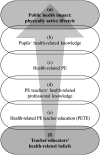Challenging German physical education teacher educators' health-related beliefs through Cooperative Planning
- PMID: 34905615
- PMCID: PMC8672932
- DOI: 10.1093/heapro/daab163
Challenging German physical education teacher educators' health-related beliefs through Cooperative Planning
Abstract
Physical education teacher educators' health-related beliefs can impact public health. An interactive knowledge-to-action approach, such as Cooperative Planning, might challenge the health-related beliefs of physical education teacher educators, thus contributing to innovation in teacher education. We investigated what health-related beliefs physical education teacher educators had before a Cooperative Planning intervention, how these developed throughout the intervention and how teacher educators' perceptions of Cooperative Planning can explain the identified changes and continuities. We established two Cooperative Planning groups that included physical education teacher educators (university lecturers and teacher trainers), researchers, study course coordinators and prospective teachers. The data of 13 teacher educators were collected before (t0) and after (t1) the Cooperative Planning using two methods: observations of teaching practice and interviews. The data analysis was based on the following categories: (i) epistemic beliefs about health (e.g. salutogenic understanding), (ii) beliefs about the health topic in physical education (e.g. health-related knowledge and understanding), (iii) beliefs about the health topic in physical education teacher education (e.g. health-related pedagogical content knowledge) and (iv) process-related beliefs about Cooperative Planning. The findings revealed that teacher educators' health-related beliefs were rather stable but could be challenged through a Cooperative Planning intervention. Epistemic beliefs about health remained, whereas more practice-related beliefs about the health topic in physical education and physical education teacher education changed in individual ways. Here, a change in beliefs was more likely when the participants were open to change and when Cooperative Planning offered opportunities to engage in concrete lesson planning.
Keywords: beliefs; health; physical education; teacher education.
Plain language summary
The health-related beliefs of physical education teacher educators are assumed to play an important role in fostering and implementing the public health agenda. In this article, we report on a Cooperative Planning intervention in which physical education teacher educators (university lecturers and teacher trainers), physical education teacher students, study course coordinators and researchers worked together to develop health-related courses for physical education teacher education. Specifically, we investigated what health-related beliefs teacher educators had before a Cooperative Planning intervention, how these developed throughout the intervention and how teacher educators’ opinions of Cooperative Planning can explain how their beliefs changed. Based on interviews and observations, we analysed teacher educators’ epistemic beliefs about health, that is, their general understanding of health, their beliefs about the health topic in physical education and physical education teacher education and their process-related beliefs about Cooperative Planning. The findings showed that teacher educators’ health-related beliefs were rather stable but could be challenged through Cooperative Planning. Epistemic beliefs about health remained, whereas more practice-related beliefs about the health topic in physical education and physical education teacher education changed in individual ways. A change in beliefs was more likely when the Cooperative Planning participants were open to change and when the Cooperative Planning offered opportunities to engage in concrete lesson planning.
© The Author(s) 2021. Published by Oxford University Press.
Figures
Similar articles
-
Capturing epistemic reflexivity for teacher educators teaching about/to/for diversity in teacher education.Heliyon. 2023 Feb 15;9(2):e13754. doi: 10.1016/j.heliyon.2023.e13754. eCollection 2023 Feb. Heliyon. 2023. PMID: 36852076 Free PMC article.
-
[Teacher educators and health education: from their concepts to their professional identity].Sante Publique. 2013 Nov-Dec;25(6):737-46. Sante Publique. 2013. PMID: 24451419 French.
-
Physical educators' beliefs about teaching children with disabilities.Percept Mot Skills. 2008 Apr;106(2):637-44. doi: 10.2466/pms.106.2.637-644. Percept Mot Skills. 2008. PMID: 18556916
-
The Role of EFL Teachers' Self-Efficacy and Emotional Resilience in Appraisal of Learners' Success.Front Psychol. 2022 Jan 4;12:817388. doi: 10.3389/fpsyg.2021.817388. eCollection 2021. Front Psychol. 2022. PMID: 35058866 Free PMC article. Review.
-
A Systematic Review of Teaching Games for Understanding Intervention Studies From a Practice-Referenced Perspective.Res Q Exerc Sport. 2022 Dec;93(4):670-681. doi: 10.1080/02701367.2021.1897066. Epub 2021 Oct 27. Res Q Exerc Sport. 2022. PMID: 34705604
Cited by
-
The challenge of participatory projects for physical activity promotion: What to scale and how to scale?PLoS One. 2025 Jun 30;20(6):e0326737. doi: 10.1371/journal.pone.0326737. eCollection 2025. PLoS One. 2025. PMID: 40587523 Free PMC article.
-
Cooperative planning and its utilization in German physical activity promotion: a brief introduction.Health Promot Int. 2021 Dec 13;36(Supplement_2):ii1-ii7. doi: 10.1093/heapro/daab170. Health Promot Int. 2021. PMID: 34905606 Free PMC article. No abstract available.
References
-
- Brandl-Bredenbeck H. P., Sygusch R. (2017) Highway to health—an innovative way to address health in physical education teacher education (PETE). Retos, 31, 312–327.
-
- Bulger S. M., Mohr D. J., Carson L. M., Wiegand R. L. (2001) Infusing health-related physical fitness in physical education teacher education. Quest, 53, 403–417.
-
- Calderhead J. (1981) Stimulated recall: a method for research on teaching. British Journal of Educational Psychology, 51, 211–217.
-
- Cale L., Harris J. (2018) The role of knowledge and understanding in fostering physical literacy. Journal of Teaching in Physical Education, 37, 280–287.
-
- Demetriou Y., Sudeck G., Thiel A., Höner O. (2015) The effects of school-based physical activity interventions on students’ health-related fitness knowledge: a systematic review. Educational Research Review, 16, 19–40.
MeSH terms
Grants and funding
LinkOut - more resources
Full Text Sources



